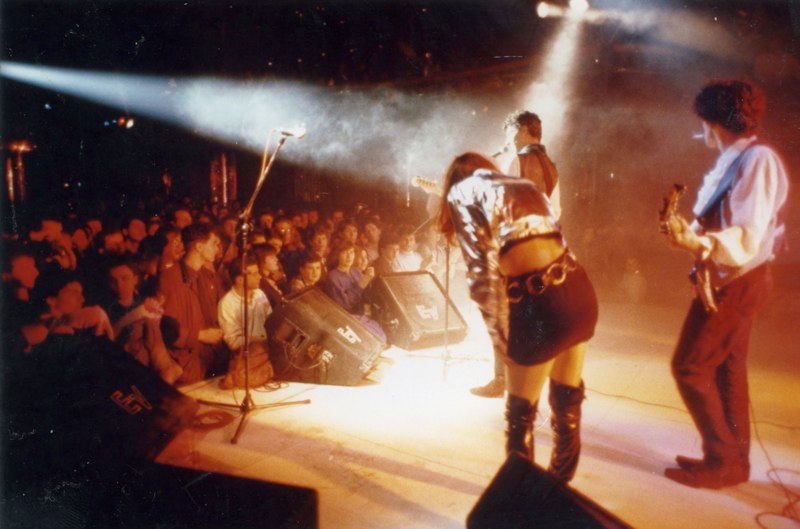Movida viguesa on:
[Wikipedia]
[Google]
[Amazon]
The Movida viguesa (or Movida gallega) was an important youth cultural movement that took place in
 The movida viguesa was born out of local pubs and bars like ''Angara'' and ''Satchmo.'' The city boomed with new bands, leading to the rise of music groups like ''Bar'', ''TrenVigo'' and ''Mari Cruz Soriano y los que afinan su piano'' (later known as Siniestro Total). Heavily influenced by
The movida viguesa was born out of local pubs and bars like ''Angara'' and ''Satchmo.'' The city boomed with new bands, leading to the rise of music groups like ''Bar'', ''TrenVigo'' and ''Mari Cruz Soriano y los que afinan su piano'' (later known as Siniestro Total). Heavily influenced by
''La otra Movida Viguesa''
Galician music Social movements in Spain Vigo 1980s in Galicia (Spain) 1980s in Spanish music
Vigo
Vigo ( , , , ) is a city and Municipalities in Spain, municipality in the province of Pontevedra, within the Autonomous communities of Spain, autonomous community of Galicia (Spain), Galicia, Spain. Located in the northwest of the Iberian Penins ...
, Spain
, image_flag = Bandera de España.svg
, image_coat = Escudo de España (mazonado).svg
, national_motto = ''Plus ultra'' (Latin)(English: "Further Beyond")
, national_anthem = (English: "Royal March")
, i ...
during the 1980s, coinciding with the Movida Madrileña (the "Golden Age for Spanish Pop"). By the late seventies, the industrial port city of Vigo suffered high levels of youth unemployment and a massive, industrial reform of the naval sector. Born out of this context, the Movida viguesa was primarily a musical and aesthetic movement: a counterculture centered around nightlife and bars in the historic city center. It challenged the traditional values of the period amidst the general atmosphere of economic crisis as well as political skepticism (resulting from an overall sense of disenchantment during the political transition from Franco
Franco may refer to:
Name
* Franco (name)
* Francisco Franco (1892–1975), Spanish general and dictator of Spain from 1939 to 1975
* Franco Luambo (1938–1989), Congolese musician, the "Grand Maître"
Prefix
* Franco, a prefix used when ref ...
's fascist dictatorship to a democracy).
Origins
 The movida viguesa was born out of local pubs and bars like ''Angara'' and ''Satchmo.'' The city boomed with new bands, leading to the rise of music groups like ''Bar'', ''TrenVigo'' and ''Mari Cruz Soriano y los que afinan su piano'' (later known as Siniestro Total). Heavily influenced by
The movida viguesa was born out of local pubs and bars like ''Angara'' and ''Satchmo.'' The city boomed with new bands, leading to the rise of music groups like ''Bar'', ''TrenVigo'' and ''Mari Cruz Soriano y los que afinan su piano'' (later known as Siniestro Total). Heavily influenced by postmodernism
Postmodernism is an intellectual stance or Rhetorical modes, mode of discourseNuyen, A.T., 1992. The Role of Rhetorical Devices in Postmodernist Discourse. Philosophy & Rhetoric, pp.183–194. characterized by philosophical skepticism, skepticis ...
, each had with their own distinct style (punk
Punk or punks may refer to:
Genres, subculture, and related aspects
* Punk rock, a music genre originating in the 1970s associated with various subgenres
* Punk subculture, a subculture associated with punk rock, or aspects of the subculture s ...
, pop, techno
Techno is a genre of electronic dance music (EDM) which is generally produced for use in a continuous DJ set, with tempo often varying between 120 and 150 beats per minute (bpm). The central rhythm is typically in common time (4/4) and often ch ...
, reggae
Reggae () is a music genre that originated in Jamaica in the late 1960s. The term also denotes the modern popular music of Jamaica and its diaspora. A 1968 single by Toots and the Maytals, " Do the Reggay" was the first popular song to use ...
, ska
Ska (; ) is a music genre that originated in Jamaica in the late 1950s and was the precursor to rocksteady and reggae. It combined elements of Caribbean mento and calypso with American jazz and rhythm and blues. Ska is characterized by a walki ...
, funk
Funk is a music genre that originated in African American communities in the mid-1960s when musicians created a rhythmic, danceable new form of music through a mixture of various music genres that were popular among African Americans in the m ...
) with chaotic, comical and irreverent lyrics that reflect the concentrated plurality of voices and opinions.
The movida then spread to other iconic pubs, many of which are still open, such as ''El Kremlin'', ''El Manco de Lepanto'' and ''El Ruralex'' (now called ''Vademécum'').
Among the more notable bands of this period were Golpes Bajos
Golpes Bajos was a 1980s pop group in Spain, a part of the so-called ''"Edad de Oro del Pop Español"'', i.e. "The Golden Age of Spanish Pop Music". They were active in 1982–1986, with a final reunion tour in 1997–1998.
History
''Golpes Bajo ...
(a grouped organized by Germán Coppini), Aerolíneas Federales, Os Resentidos (led by Antón Reixa), Semen Up and Ultramarinos Troncoso (the only techno band in Vigo during this period). They enjoyed incredible success, but only Siniestro Total is still active today, achieving international success.
Video art was a particularly significant medium of the time. Director Xavier Villaverde produced one of the most recognizable music videos of the Movida viguesa: “Galicia Caníbal” by Os Resentidos. This song would later become an anthem of the Movida viguesa, achieving national recognition throughout Spain.
During a weekend trip to Galicia in September, 1986, Cabinete Caligari, Los Nikis, Alaska and los Pegamoides effectively married the movida madrileña and the movida viguesa. A planned reunion in Madrid (spring, 1987) failed to take place.
References
{{ReflistExternal links
''La otra Movida Viguesa''
Galician music Social movements in Spain Vigo 1980s in Galicia (Spain) 1980s in Spanish music